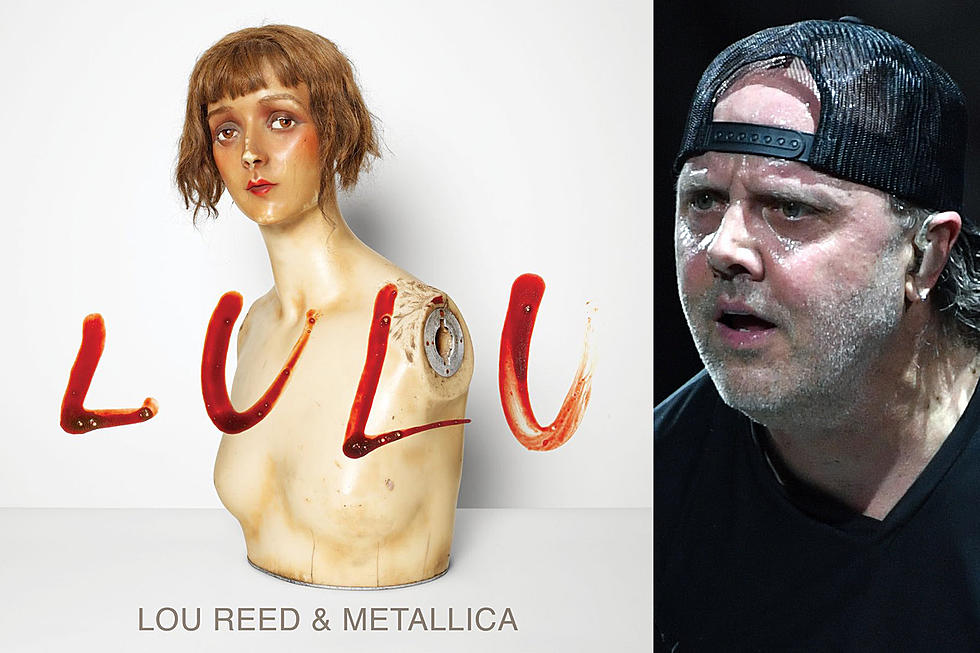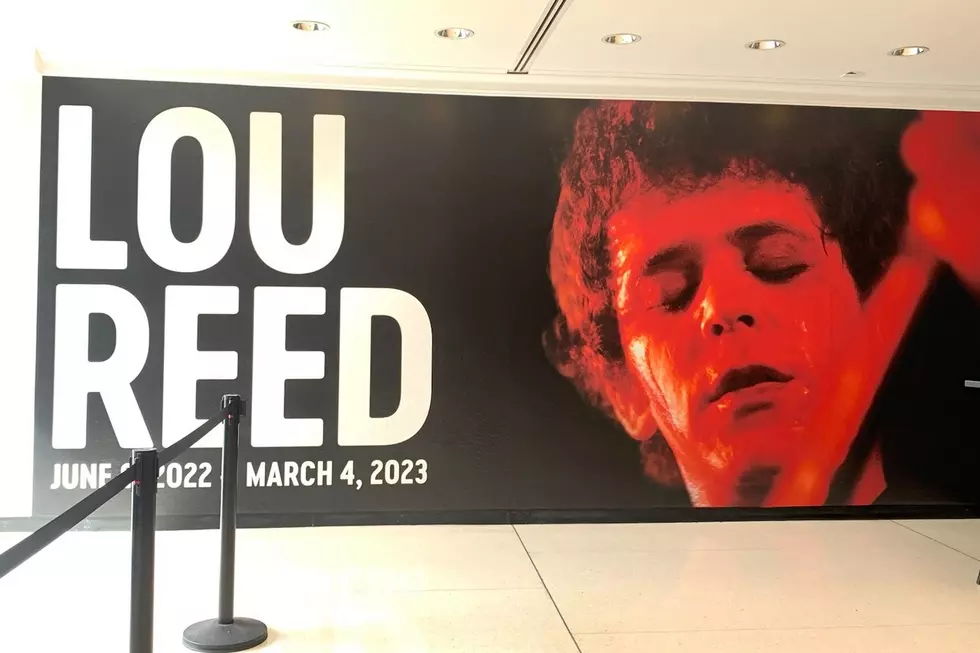
How Lou Reed Became a Top 40 Star With ‘Transformer’
“If Bowie’s doing Lou, and if Lou’s doing Bowie, Lou’s still doing Lou.” That’s how Lester Bangs (or, really, the fictional version of the famed rock critic played by Philip Seymour Hoffman) defended Lou Reed’s early ’70s rise to glam rock stardom in Cameron Crowe’s movie Almost Famous.
With Reed-ian concision, the character cut through the tangle of a mutual appreciation society that Reed and David Bowie had built with 1972’s Transformer.
Before the two iconoclasts teamed up, Bowie was simply a fan who had become obsessed with the 1967 debut LP by Reed’s band the Velvet Underground. The Velvets might not have sold a ton of records, but in being attached to the allure of Andy Warhol and delivering songs about taboo subjects, the New York band became infamous and influential. Bowie, among others in ’70s glam rock, internalized both the Velvets’ sound and Reed’s words.
“Just the verbal and musical zeitgeist that Lou created, the nature of his lyric writing had been hitherto unknown in rock, I think,” Bowie said in 1997's Classic Albums documentary “He gave us the environment in which to put our more theatrical vision. He supplied us with the streets and the landscape, and we peopled it.”
But while Bowie, Marc Bolan and other glam rockers were becoming big stars, Reed was retreating from the spotlight. After a few years and a few records with the Velvet Underground, the singer, songwriter and guitarist left the band, left Manhattan for Long Island and took a straight job as a typist for his father’s accounting firm. He thought about what he wanted to do next.
“Did I want to do it myself? Did I want to have a band? Did I just want to do songwriting, not even get onstage?” Reed remembered asking himself to Rolling Stone in 1989. “I’m the last person in the world I’d have thought should be on a stage. Some people really like having a spotlight on them. I don’t.”
Listen to Lou Reed's 'Satellite of Love'
In 1971, however, he signed a record contract with RCA and released his self-titled solo debut the following year. Filled with unreleased Velvets material, Lou Reed flopped – although the LP got some positive press (pretty much the story of Reed’s career). But Bowie liked it, as did his Spiders From Mars guitarist Mick Ronson, and the pair approached their hero with a plan to collaborate. They were both on the same label anyway, and Bowie was becoming a pop phenomenon with the June 1972 release of Ziggy Stardust and the Spiders From Mars.
“I was petrified that he said yes, he would like to sort of work with me in a producer capacity,” Bowie told American Masters, “because I had so many ideas and I felt so intimidated by my knowledge of the work that he had already done. And, even though there was only that [little] time between us, it seemed like Lou had this great legacy of work, which indeed he did have. … But he just gave the whole project over to me and I really hoped I wouldn’t let him down.”
Bowie and Ronson became the project’s co-producers, overseeing the sessions that took place at London’s Trident Studios, where Bowie had made his last four LPs, in August 1972. The duo orchestrated the sound of what would become Transformer, with Ronson on lead guitar, piano and recorder (in addition the string arrangement for “Perfect Day”) and Bowie on keyboards, backing vocals and acoustic guitar. They brought in expert session man Herbie Flowers (bass, tuba), Beatles associate Klaus Voormann (bass), future Rutle John Halsey (drums) and a few others, including female vocal trio the Thunder Thighs.
The sound might have been theirs, but the songs were all Reed’s, some of which (as with Reed’s debut) dated from his Velvet Underground days. Tracks such as “New York Telephone Conversation” and “Goodnight Ladies” were played live with the Velvets, while others had been recorded, but not released.
“Satellite of Love,” which had been a bouncy number with different lyrics, was transformed on Reed’s second solo album, where Ronson’s elegant piano contribution and a slower pace enhanced Reed’s caustic thoughts about technology (and his promiscuous partner). The “bum-bum-bum” backing vocals add a winking playfulness to the decay, before Bowie’s voice appears at the end to knock the satellite off its axis.
“Most people could not sing some of his melodies. He can really go for a high note,” Reed wrote about his collaborator. “Take ‘Satellite of Love,’ on my Transformer album. There’s a part at the very end where his voice goes all the way up. It’s fabulous.”
Listen to Lou Reed's 'Walk on the Wild Side'
“Andy’s Chest” was another song from the Velvet era, focusing on the attempt made on Warhol’s life in 1968. “Vicious” came from something the artist had told him. But “Walk on the Wild Side” found Reed in a more reflective space – thinking about the denizens of Warhol’s famous Factory.
All of the people named in the song are real: Holly Woodlawn was a transgender actress from Miami, Candy Darling (also the subject of the Velvet Underground’s “Candy Says”) was another transgender actress who hung out in the back room of Max’s Kansas City, “Little Joe” Dallesandro had starred in Warhol’s Flesh, Joe “Sugar Plum Fairy” Campbell was an actor in Warhol’s The Hustler and Jackie Curtis was yet another transgender actress who wanted to play James Dean. Each figure get his or her own verse in the song.
“I always thought it would be kinda fun to introduce people to characters they maybe hadn’t met before,” Reed said, “or hadn’t wanted to meet.”
Yet, listeners became enthralled with this song (Transformer’s first single) about hustling artists, drug dealers and prostitutes – although many may not have paid close attention to the lyrics. The censors certainly didn’t. The line about oral sex slipped past many of the moral authorities at radio stations in the U.K. and U.S., but the Americans were sure to cut out the reference to “colored girls,” for its racial insensitivity.
Despite, or because of, its risqué subjects, “Walk on the Wild Side” became a big hit (No. 10 in the U.K., No. 16 in the U.S., where it was his only Top 40 single). The moody, jazzy sound and singalong chorus of “doot, di-doot, di-doot … ” also played a role. The track is carried by a bass line, which is actually the sound of two different basses – a stand-up, acoustic bass and an electric bass guitar – both played by Flowers. As a session player, he got paid twice for the job. The concluding baritone saxophone vamp was played not by Bowie, but the man who had taught Ziggy to play the sax years before, Ronnie Ross.
Listen to Lou Reed's 'Perfect Day'
While the success of “Walk on the Wild Side” in effect gave Reed a solo career, his relationship to the song was sometimes strained. He made comments about his frustrations with feeling obligated to perform it in concert every time. Later in his career, however, he made peace with the song.
“Without it, who knows, maybe I’d be digging a ditch somewhere,” Reed said in 2004. “So, thank God for it.”
By the 21st century, “Walk on the Wild Side” had company in terms of well-known Reed songs. Over time, the fellow Transformer track “Perfect Day” had become celebrated in cover versions (including a 1995 version by Duran Duran), an appearance in 1996’s Trainspotting and a 1997 BBC charity single that featured Reed alongside an all-star cast including Bono, Elton John, Emmylou Harris, Tom Jones, Dr. John and even the song’s original co-producer Bowie. It became a No. 1 hit and Reed expressed relief that he now had a different song that he was expected to play live.
Even though “Perfect Day” was less explicit in its subject matter than “Walk on the Wild Side,” it’s long been thought that Reed is singing about his “perfect day” on heroin (hence showing up on the Trainspotting soundtrack). But the weary ballad’s inspiration also might have been Reed’s fiancée at the time or a former girlfriend. All of that might be wrapped up together, left for the listener to interpret.
Rock writers’ initial interpretation, once RCA released Transformer on Nov. 8, 1972, was that the LP was a disappointment. Critics felt that Bowie, Ronson and glam posturing had subsumed Reed and that the songs did not live up to his work in the Velvet Underground. Rolling Stone infamously called the album “homo stuff.” But, with the pop-radio ascendance of “Walk on the Wild Side,” Transformer became a hit, charting at No. 29 in the U.S. and No. 13 in the U.K.
Over time, opinions have become more generous. If few consider Transformer Reed’s masterpiece, it still appears in conversations of the best rock albums ever made, with the collaboration between Bowie and Reed highlighted. Even if the record showcased Lou taking on Bowie’s sound, in the end, Lou was still doing Lou.
See Lou Reed Among the Top 200 '70s Rock Songs
Lou Reed Released One of Rock’s Most Hated Albums
More From Ultimate Classic Rock









